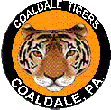EXCERPT:
Once the ethnically diverse styles of polka music took root in the coal regions, they grew strong.
The King Brothers Orchestra flourished in Coaldale, and in Lansford, Joe Orsulak's Gypsy Joe & the Emeralds and Joe Mordarsky, "The Singing Polish Plumber," held sway.
The King Brothers, along with Happy Stefan and The Sullivans, played every Friday night at the former Edgemont Lodge in Lansford. Saturday nights, the Russian Club in Coaldale was the place to tap your feet to the polka beat.
FULL ARTICLE:
Beginning in the mid-1800s, an influx of immigrants from Poland, Hungary, Slovakia and other eastern and central European countries settled in the Panther Valley, drawn by the promise of work in the coal mines and later, the steel industry.
The work was hard and dangerous, but the miners and their families found comfort in their strong religious faith, and joy in their lively polka music.
They often combined the two for picnics and wedding receptions, a tradition that continues to this day; rare is the church picnic, block party or bazaar that lacks a polka band.
The word "polka" is believed to stem from "pulka," a Czech word meaning little half, a good description of the short, heel-toe polka dance steps. Others believe the word has Polish origins.
Polka music has grown from strong roots in Eastern and Central Europe, says Carl Rahkonen, music librarian and professor of music at Indiana University of Pennsylvania. The musical style and instruments vary according to region.
"There are several polka styles in the United States, talked about by Charles Keil in his book Polka Happiness," Rahkonen said. "Basically in Pennsylvania we have two styles, Slovenian and Polish. The German (Czech) style of the Upper Midwest is not as frequently seen in Pennsylvania, and neither is the Southwestern (Tex-Mex) type of polka.
"The Slovenian style is centered around Cleveland, coming particularly from the influence of Frankie Yankovic and bands who play his style of music," he said.
"Polish polka is strongest in Chicago, but also along the East Coast, which represent two different substyles. The Slovenians use two accordions as lead instruments and add drums and four-string rhythm banjo.
"In Polish polka there are two melodic instruments in the lead, such as two trumpets, or trumpet and a woodwind (clarinet, saxophone etc.). The accordion is more an accompanying instrument. They can also add a variety of other instruments, most frequently bass guitar and drums."
Rahkonen said he knows "Slovakian Americans, such as John Stanky of 'John Stanky and the Coal Miners' who play Polish style Stanky even sings in Polish and Ukrainian Americans, such as Larry Demtro, who play Slovenian style. Both Slovenian and Polish styles evolved here from the Eastern European immigrants who worked in the coal mines and steel industry."
Once the ethnically diverse styles of polka music took root in the coal regions, they grew strong.
The King Brothers Orchestra flourished in Coaldale, and in Lansford, Joe Orsulak's Gypsy Joe & the Emeralds and Joe Mordarsky, "The Singing Polish Plumber," held sway.
The King Brothers, along with Happy Stefan and The Sullivans, played every Friday night at the former Edgemont Lodge in Lansford. Saturday nights, the Russian Club in Coaldale was the place to tap your feet to the polka beat.
Orsulak was known for visiting the homes of brides to play Slovakian melodies on his fiddle and at St. Michael's Church, said legendary DJ "Polka Joe" Manjack.
Orsulak led the Emeralds for 38 years before his passing in 1989, and the music of Mordarsky, known for his "Post Office Polka," was silenced upon his death in 2008.
When Orsulak passed away, The Pennsylvania Villagers established roots in Lansford.
The band wrote a song for Manjack, "DJ Polka Joe." He plays that one every May to celebrate his polka show anniversaries.
The Shoreliners, too, originated in the Lansford area, he said. The group was known for their "Union Man" polka.
It was Lansford where Manjack first received guidance on what to play on his wildly popular Magic Polka Machine, broadcast every Sunday from 10 a.m. to 1 p.m.
The late Ernie Koshuta, known as the "Night Mayor of Lansford," was a member of the U.S. Polka Association and worked at his brother's hobby store/deli, Barny's, on East Ridge Street.
"Ernie used to sell his polka records in there. Being 18, I didn't know what to play, and somehow I got directed to Ernie," Manjack said. "I'd go over there and he'd tip me off on which songs to play, which were the good polkas."
Manjack has spun the polka hits for 37 years, beginning with his first show in May 1974, at WZTA on Dutch Hill in Tamaqua.
"Sunday afternoon, for one hour," he recalls. "Twelve noon 'til one."
Manjack grew up on Dutch Hill with polka music.
"It was always a tradition to have the polkas on during Sunday dinner," he said. "We lived a block from the studio, and my Mom would take the halupki and the pierogi down there to the guy who was doing the show at the time. I was 10 years old, and so I just got involved."
He was on the air by age 15.
What do people ask him to play the most?
"Over the past five years, it's been "The Hot Dog Polka," Manjack said.
I'd get a call every Sunday at about 20 minutes to 1."
He doesn't play the tune unless it's requested.
Years ago, the most popular polka was a waltz, "All I Ever Need is You" by Eddie Carosa.
Source: https://www.tnonline.com/2011/may/16/panther-valley-polka-lively-music-has-deep-roots-coal-region

